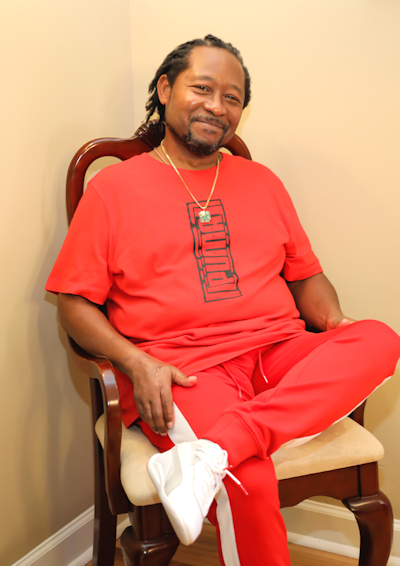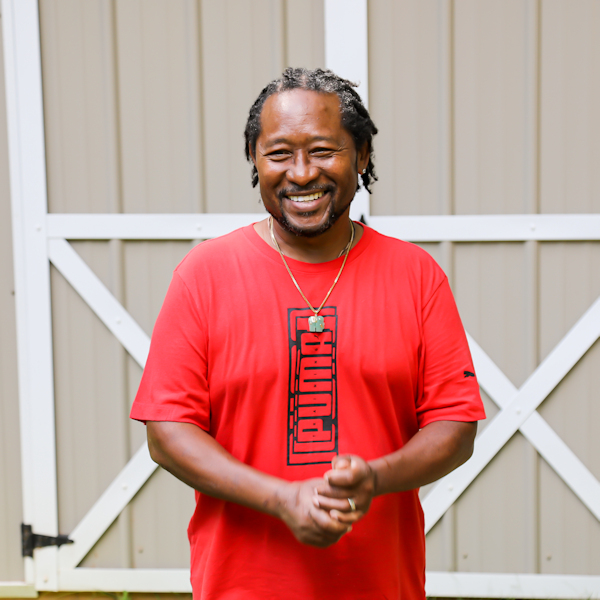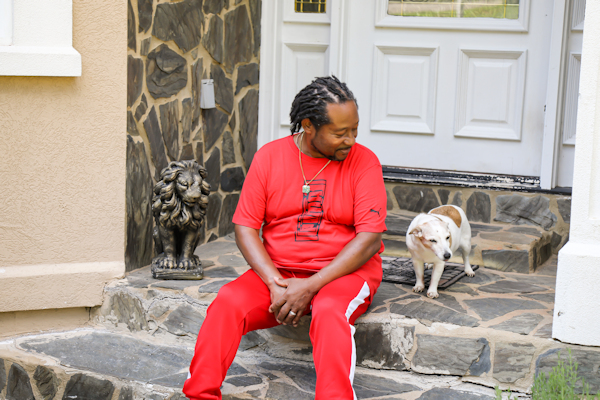Courtney Mills is a man who always wants to be in control. Whether he’s negotiating contracts for his clients or dealing with aspects of his personal life, Mills is most comfortable when he’s the one calling the shots.
 So, when he was diagnosed with breast cancer earlier this year and had to give up some of that control, the Navy veteran who served in Afghanistan found himself in uncertain — and very uncomfortable — territory. And he was not happy.
So, when he was diagnosed with breast cancer earlier this year and had to give up some of that control, the Navy veteran who served in Afghanistan found himself in uncertain — and very uncomfortable — territory. And he was not happy.
The first sign of trouble struck in the middle of the night in December 2021 when Mills awoke in his Fairfield Plantation home and felt a slight pain in his right chest area and his shirt was wet. Thinking he’d had a night sweat, he slipped into the bathroom to change and discovered his white T-shirt was red with blood. He checked but felt no lumps in his chest area.
Mills — Kingston, Jamaica-born and self-described as stoic by nature — covered the blood stain on the mattress before returning to bed to sleep. He awoke to more blood in the morning but quickly cleaned up the bed and his clothes to avoid alerting Alicia, his wife of 32 years.
“It should have bothered me more, but it didn’t,” Mills said.
Three days later, it happened again and this time, blood was dripping from his right nipple. It was time to tell Alicia and reach out for an appointment with his physician, Alicia Jennings, MD, with Tanner Primary Care at Mirror Lake in Villa Rica after New Year’s.
Through the holidays, Mills experienced several more bleeding bouts before his appointment. Pain was now emanating from his chest to his armpit.
Time to seek a doctor’s care
Extremely concerned that blood was now squirting from Mills’ nipple when she examined him, Dr. Jennings arranged for a mammogram and an appointment with Raul Zunzunegui, MD — also known as “Dr. Z” by his patients — a breast surgeon with Tanner’s Comprehensive Breast Care Center. The mammogram was done just three days later. Mills tried to negotiate a phone conversation to discuss the results, but Dr. Z insisted on an in-person appointment at his practice.
There, Dr. Z revealed that all signs pointed to cancer, but he wasn’t certain. He recommended a biopsy of the mass under the nipple the next morning, which would be done in his office under local anesthetic.
The immediate timing signaled the seriousness of the situation for Mills. “Did it really need to be done that soon?” Mills asked. He found himself negotiating again. “Dr. Z said, ‘Bloody nipple discharge is always a very worrisome sign in a man, though less likely in women. Either way it needs further investigation.’”
“Now, I was semi-nervous. I was actually more concerned about having to tell my wife what was going on and decide what to do about telling my kids until I knew where I was, stagewise, etc. I am the rock in my family, and everyone depends upon me for advice and support. ‘Don’t worry about things; Daddy will take care of it.’ What would they do if something happened to me? I made a concerted effort not to inform our two daughters, ages 38 and 23, and son, age 30, until I knew exactly what we were dealing with,” said Mills.
Mills returned to Dr. Z’s office four days later to discuss the results but not without trying once again to negotiate a phone discussion instead of an office visit.
“Dr. Z was firm that these situations are all different and a face-to-face discussion was important so he could lay out all the details. I realized then that it was probably cancer. I do have a lot of cancer in my family – lung, ovarian, brain – but no breast cancer among any of my family members, regardless of gender,” said Mills.
During the appointment, Dr. Z confirmed Mills had cancer and said there is always the possibility it might’ve spread into the lymph nodes. “I was feeling numb at that point,” said Mills.
The Tanner Cancer Care Promise
The Tanner Cancer Care Promise means that within three days of diagnosis, patients will:
- Meet with a team of cancer care specialists
- Get answers to important questions
- Learn about treatment options
- Develop an individualized treatment plan
 Dr. Z’s treatment plan for Mills included surgery to remove his right nipple, the mass and the sentinel lymph node, located in the armpit and closest to the mass, and possibly more nodes depending on what the surgeon found during surgery to assess the spread of the disease. Pathology assessment of the removed tissue would inform further treatment recommendations.
Dr. Z’s treatment plan for Mills included surgery to remove his right nipple, the mass and the sentinel lymph node, located in the armpit and closest to the mass, and possibly more nodes depending on what the surgeon found during surgery to assess the spread of the disease. Pathology assessment of the removed tissue would inform further treatment recommendations.
Surgery was recommended in one week, but Mills had a conflict and he wasn’t willing to negotiate on it: a long overdue family trip to St. Kitts, rescheduled due to COVID, for him and his wife, their three adult children and one 7-year-old grandson.
“I didn’t want to spoil the trip, dampen the entire mood or cancel. I wanted to make sure they had a good time, and then after the trip I would finally tell them what we were facing,” he said.
“We had a wonderful trip together. On the Sunday after we returned home, we had a frank discussion that I had cancer and would have surgery the following Friday. They were very surprised that I was diagnosed, but they knew cancer was prevalent in the family line. Dr. Z also arranged for genetic testing to assess their cancer risk, which I appreciated,” said Mills.
Dr. Z performed Mills’ surgery at Tanner Medical Center/Carrollton. Pathology reports on the two lymph nodes yielded good news: the cancer had not spread further.
Following surgery, Mills consulted Randall Pierce, MD, a medical oncology specialist with Northwest Georgia Oncology Centers, who recommended a five-year course of hormone therapy — Tamoxifen — to prevent the recurrence of cancer.
Mills has a new appreciation for his wife’s complaints about hot flashes after starting Tamoxifen.
“I used to complain about her always keeping the house cold. I didn’t understand then, but I do now,” he said.
“My wife has been my rock through this diagnosis and treatment,” said Mills.
He also credits his elder daughter, Davilla, for reaching out to him every day to check on how he was feeling, what his doctors were saying and other details.
Great care and empathy
Mills commends the Tanner Cancer Care team for how they patiently worked with him through the lack of control he faced with his diagnosis and the emotions that resulted.
 “I was not an easy patient. I am usually in control, and suddenly, I wasn’t. My kids often say, ‘Daddy is loud!’ I can be very harsh, but the Tanner team met me with great care and empathy. The entire staff was extremely caring and the most empathetic people I have met. They assured me that we could work things out and their tone of voice and mannerisms made a difference for me,” said Mills.
“I was not an easy patient. I am usually in control, and suddenly, I wasn’t. My kids often say, ‘Daddy is loud!’ I can be very harsh, but the Tanner team met me with great care and empathy. The entire staff was extremely caring and the most empathetic people I have met. They assured me that we could work things out and their tone of voice and mannerisms made a difference for me,” said Mills.
“There are so many emotions involved with a cancer diagnosis. You’re scared, worried about mortality and your family. I was having trouble wrapping my head around all of that. I was a very hard patient in the beginning. Then I began to realize what they were trying to do for me. Dr Z explained that regardless of how good a doctor is, they are in the practice of medicine, always seeking the best for their patients and trying to understand what they are going through. That changed a lot of my aggression and I have softened a bit in my approach to life’s issues in general,” Mills said.
One statement from Dr. Z was especially profound for Mills: “My staff is trying to understand what you are going through as a man with breast cancer.”
He advises other patients, especially men, to seek a doctor’s care if they experience anything unusual, like a lump.
“Time can be the difference between life and death with a cancer diagnosis,” he said.
“I thank God every morning for this life and for his goodness and grace and the ability to see another new day. I try to make each day better than yesterday, and hopefully, tomorrow will be better than today. During this life, I’ve been shot, attacked by a pit bull, had a stroke, and now I’ve had cancer. Cancer does not have to be a death sentence. I am still standing,” said Mills.
Learn more at TannerCancerCare.org.